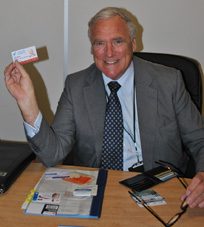Most major cities and towns in the UK have identity factories, acquiring printing equipment to produce high quality counterfeits of official documents. So says a Home Office document.
That matters to you, whether you’re in banks or airports, or securing a ticketed event that has a problem with fake tickets; or a doorman at a pub or club asking teenagers to prove their age. “The use of scanner technology by public and private sector organisations should be encouraged,” says the Home Office. Indeed, the document speaks of ‘widespread use of identity scanners throughout Government’. Briefly, document scanners provide a way to establish the authenticity of documents presented to verify identity. Scanners cannot be as good as people trained to spot a forgery; but can support front line staff to screen out counterfeit documents. “Scanners work by taking a high resolution image of an original document, using a dedicated reader, and comparing the facial image and security features embedded within the document to a database with data from many countries. They can be used, depending on the contents of the database, to authenticate Government issued documents, European ID cards and commercial documents such as concert tickets.” As the Home Office warns, counterfeit documents continue to be illegally made, many to a high standard, by fraudsters; to open bank accounts, for example, to launder money. Likewise, whether in the NHS, or getting a job in guarding, job-seekers may pay for fake ID as a way to get work or services.
Pictured is Lord Taylor, the Home Office minister featured in the April 2013 print issue of Professional Security, publicising Project Genesius (see below). Lord Taylor is holding a fake ID made out in his name with his colour photograph, to illustrate how in the wrong hands specialist printers can make professional-looking ID.
What to do
As the Home Office points out, it’s one thing to find out whether a document is genuine or false; another thing to do something about the person holding it. In other words, what about the public and private sectors sharing what they know about fake documentation? Something more than your own company ‘watch list’? The Government says that from talking to manufacturers, retailers and customers of scanners, the products do detect fraudulent documents and can generate data, which could then be shared. Scanners won’t end the problem, the authorities warn; they might not spot an imposter (someone looking like the person holding the ID, who had his photo taken). Nor can scanners be used as evidence for prosecutions. But, the Home Office suggests, scanners are a ‘useful tool’, to filter IDs, are fairly easy to use, and have proved a deterrent. A scanner is better than ‘a basic visual inspection by a person with no or limited training in examining documents’; in other words, the security officer on the gate or reception desk.
Not power to seize
What do you do, if using a scanner and a false document crops up? Police have the power to seize that ID; you do not. As the Home Office, hints, the person with the fake ID, if rumbled, may cause trouble (’health and safety of staff is paramount’). So you can ask to keep the false ID, and say that you will call police, but if you have to, you should hand the false ID back. As for which scanner to use, the Government does not endorse a product, system or company. But the Home Office does suggest that if you buy a scanner, you should write into the deal that the scanner’s database is routinely updated as new sorts of documents are released. Also, like any product, a scanner will need checking that it’s still working properly. Is widespread use of scanners to catch fake IDs plain sailing? No. One of the first acts of the Coalition was to halt the Labour Government’s national ID card. In other words, the Liberal Democrat side of the Coalition does not care, for privacy reasons, for any state holding of data. Besides, scanners are not perfect; might they flag up an ID as suspect, merely because it is damaged? In other words, might you install scanners to deter a few fake IDs, only to cause far more ructions because law-abiding people are made to feel suspected criminals?! As the document says, scanners are only ever a ‘first line of defence’, and ‘a supplement to the experience of document experts’, and indeed any manual check. The Home Office does address the law; for instance, data protection. The Information Commissioner’s Office accepts sharing data about false IDs, because in effect you are reporting a crime; but you have to at least consider (and be seen to do so – in writing) such legal issues as human rights. The Home Office suggests a ‘Data Sharing Agreement or Memorandum of Understanding’ to make things formal. The document offers specimen agreements. How long, for instance, are you keeping the scanned data? The document suggests deleting after 24 hours. Who can access the data, and who are you telling about false IDs? Is the data kept securely?
Background
We’ve featured Project Genesius, set up in 2007 by the Met Police to work with suppliers of plastic card printers, urging the sector to profile customers and not sell to doubtful customers. However, some suppliers still sell the kit, no questions asked. Hence as reported in our October issue, the Government is looking to make it an offence to supply such specialist kit, if the seller knows that it’ll be used for fraud. Visit www.projectgenesius.org.uk.
For the 30-page Home Office document on scanners in full, visit – https://www.gov.uk/government/uploads/system/uploads/attachment_data/file/251499/Document_Scanner_Guidance.pdf










